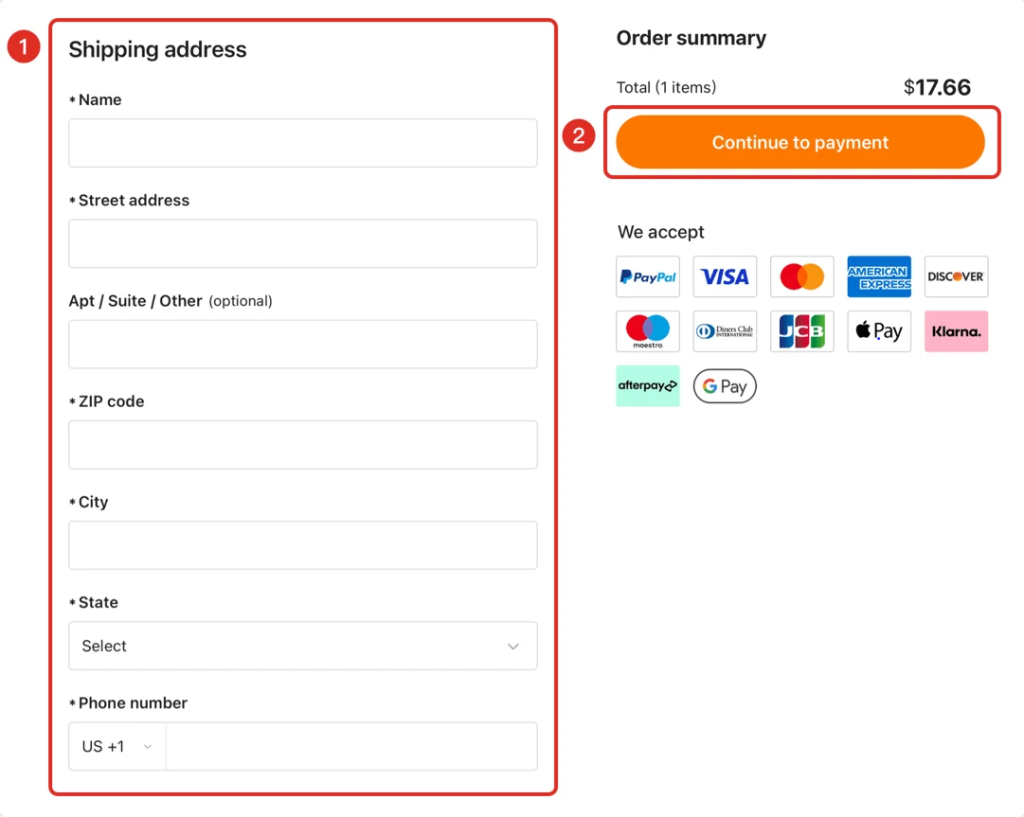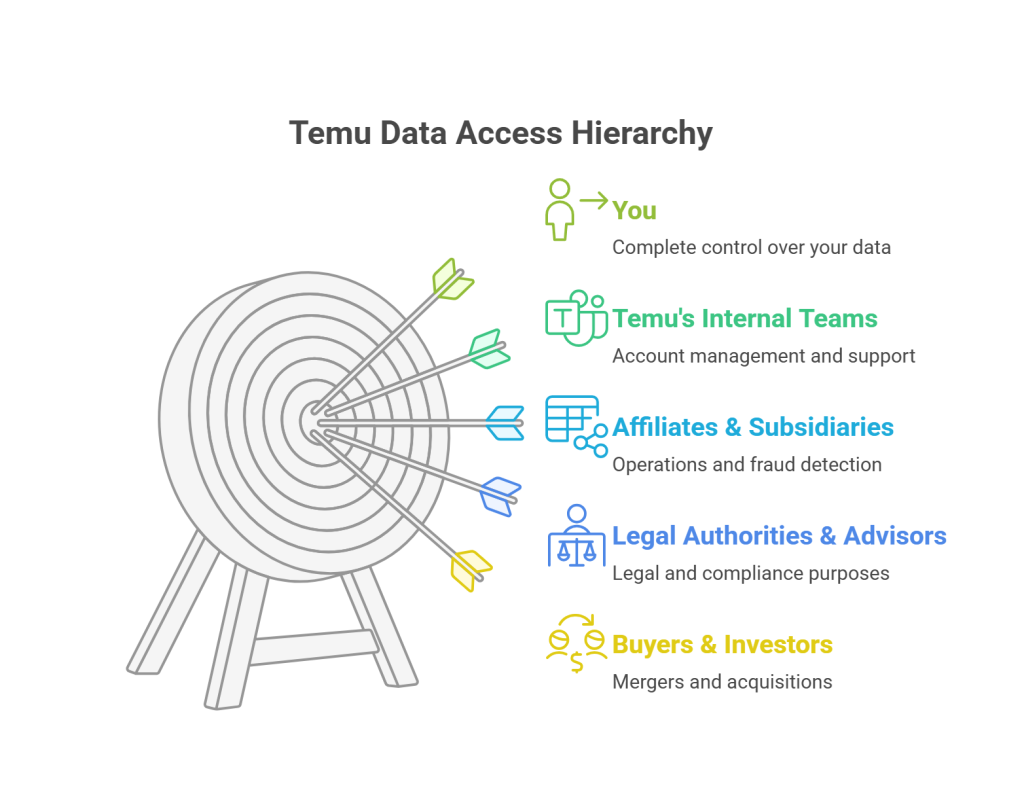These days, everyone’s hopping on the online shopping trend.
After all, who wouldn’t want to order stuff at low prices without leaving the couch?
That’s exactly why Temu has quickly become one of the most downloaded apps in the U.S.
But with its popularity, several questions have also popped up.
- Is Temu really safe to use?
- How much data does the Temu app collect compared to AliExpress, eBay?
- Temu is a Chinese app…so should I trust it with my sensitive data?
With Temu being a newer platform and still unknown to many, it’s only natural to feel a bit unsure.
No worries – I’ve got you. This blog will break it all down so you can shop without worrying about data protection.
Cool. So let’s dive in.
Is Temu Safe To Use in 2025?
The first thing on everyone’s mind: Can I really trust Temu when it comes to safe payments and protecting my data?
Temu is a Chinese e-commerce platform known for offering super low prices and free shipping offers – and it’s now operating in over 70 countries.

But because of its Chinese origins, some experts have raised concerns that your personal data could potentially be used for surveillance – no surprises, there!
Also, Temu’s sister app was actually banned from the Google Play Store back in 2023 due to privacy issues – this adds more doubt in everyone’s minds.
That said, over 150 million Americans use the app daily – mostly without experiencing any security issues.
While Temu itself is generally seen as safe, it’s still smart to be cautious and use it carefully to avoid scammers.
If you want extra protection, consider using a premium VPN like SuperFree VPN.
Temu’s Data Practices – Everything You Need To Know
Every time you open the app for the first time, Temu asks you to sign up using your email.
And when you make a purchase, you’ll need to provide some sensitive details, like:
- Your billing address
- Phone number
- ZIP or postal code
- Credit card information, and more
Now, don’t be too surprised – this is standard for almost every online shopping platform.

Source: Alibaba
But here are some eye-opening questions:
- Is the data Temu collects actually safe?
- How can you be sure it’s not being shared with third parties?
- And what if someone manages to access your personal info?
To address concerns like these, Temu has made its privacy policy publicly available.
Let’s take a closer look at how their data collection actually works.
| Type of Data | Example | Sources | Purpose |
| User-Provided Information | 1. Name 2. Email 3. Billing information 4. ZIP code 5. Credit/Debit card information | Directly from you | -> Create account -> Verify your identity -> Provide Personalized settings -> Completing transactions |
| Automatically Collected | 1. Device Type 2. Current IP Address 3. Current Time | Your Device | -> Improve performance -> Consistent experience across devices |
| Tracking Tools | Cookies | Browser and activity tracking | -> Remember your preferences -> Show recommended products |
So far, so good. Now you know what type of data Temu collects.
But this still doesn’t answer this question: Who can access your sensitive data – or in other words, how secure is your personal information?
The following chart will provide a clear picture to you:

The Role of GDPR in Temu’s Data Collection
One important thing to remember is that the General Data Protection Regulation (GDPR) protects the personal data of Temu users in the European Union.
Under this law, you have clear rights – you can access, limit, or request deletion of your data at any time.
As with any digital platform operating in the EU, Temu is legally required to comply with GDPR and respect your privacy choices.
Temu vs Ali Express vs Ebay: Comparing Data Collection Risks
Imagine this scenario: you are new to online shopping, and are worried about risking your personal data.
After online research, you come across three trending E-commerce websites: Temu, AliExpress, and eBay.
The final decision will be tough for you – you don’t know which platform offers the best privacy protection or how to compare data collection policies.
You have hit a roadblock, right?
Lucky for you, I have highlighted and compared the level of privacy protection offered by these platforms.
Keep on reading, and you will get the answer very soon..
1. Scope of Data Collected
A. Temu
This online marketplace collects a broad range of user data, such as user name, billing address, device information, etc.
Third-party analytics and advertising partners also collect user behavior. The idea is to improve user experience with personalization.
B. eBay
With the consent of user – of course – it obtains data ranging from account credentials to transaction data, etc.
C. Ali Express
This is the interesting part because, based on its privacy policy, Ali Express doesn’t collect highly sensitive data like biometric info or transaction information.
Winner: Ali Express – only slightly better
2. Data Retention and Deletion
A. Temu
Temu’s data retention approach is not completely transparent, and it might hold your data indefinitely, even after you decide to delete your account.

Source: wikihow
B. eBay
Once you delete your account, eBay literally bids you farewell by deleting all your information.
Well, some data is still retained for legal reasons, and for improving security for existing and new users.
C. Ali Express
Like Temu, it doesn’t explicitly mention the data retained – according to experts, only user data, like cookies, is stored for enhancing performance.
Winner: eBay – clearly mentions the data it will retain and delete
3. User’s Consent
A. Temu
Just like any other digital platform, Temu also asks for your consent before any data is collected.
But the process is not as transparent as other options like eBay.
Once you accept the terms and conditions, you give your consent to Temu to collect data as needed.
Also, if you want, you can opt out at any time, but the process is complex.
B. eBay
Like Temu, accepting eBay’s privacy policy gives it the right to gather and save information with your consent.
What makes eBay slightly better is that it specifically asks for the user’s consent for any additional data collected, like their Biometric information.
Also, if you don’t like sharing your personal stuff, you can withdraw your consent at any time.

C. Ali Express
It is a fact that Ali Express asks for your consent clearly, and there are no indirect or tricky methods for this.
Also, users on AliExpress can opt out of targeted ads at any time – this option gives more control to users regarding the use of their data.
Winner: eBay – it has the most user-friendly way of requesting consent
Want to Shop Securely on Temu? Install SuperFree VPN
If you are worried about the safety of your online data, there is one tool you must try out: SuperFree VPN.
With SuperFree VPN, you can browse securely and shop on Temu securely as it hides your online identity and encrypts the traffic.
Here’s why this VPN is a must-have tool to make your life easier:
| Features | Description |
|---|---|
| Servers of 40+ countries | You have to choice to select the server of any prominent country you want |
| Fast Connection | Connect to any server at a rapid speed |
| High-Quality Encryption | It makes sure no-one else can access your online data by encrypting it |
| No Activity Tracking | Your privacy is protected – none of your online activity is tracked or stored |
| Completely Free of Cost | Get access to all the premium features without spending a dollar! |
Download it now, and shop online without the risk of exposing your personal data!
Final Thoughts
Your data really is yours, and any online shopping site – whether it’s eBay, AliExpress, or Temu – will reveal its data practices for transparency.
They do collect information, but each takes a different route, and it’s totally your call which one is the best for data privacy.
If you’re looking for a simple way to stay safer online, SuperFree VPN is the best option – it’s totally free, super easy to set up, and makes sure your online data is not exposed to bad guys.












